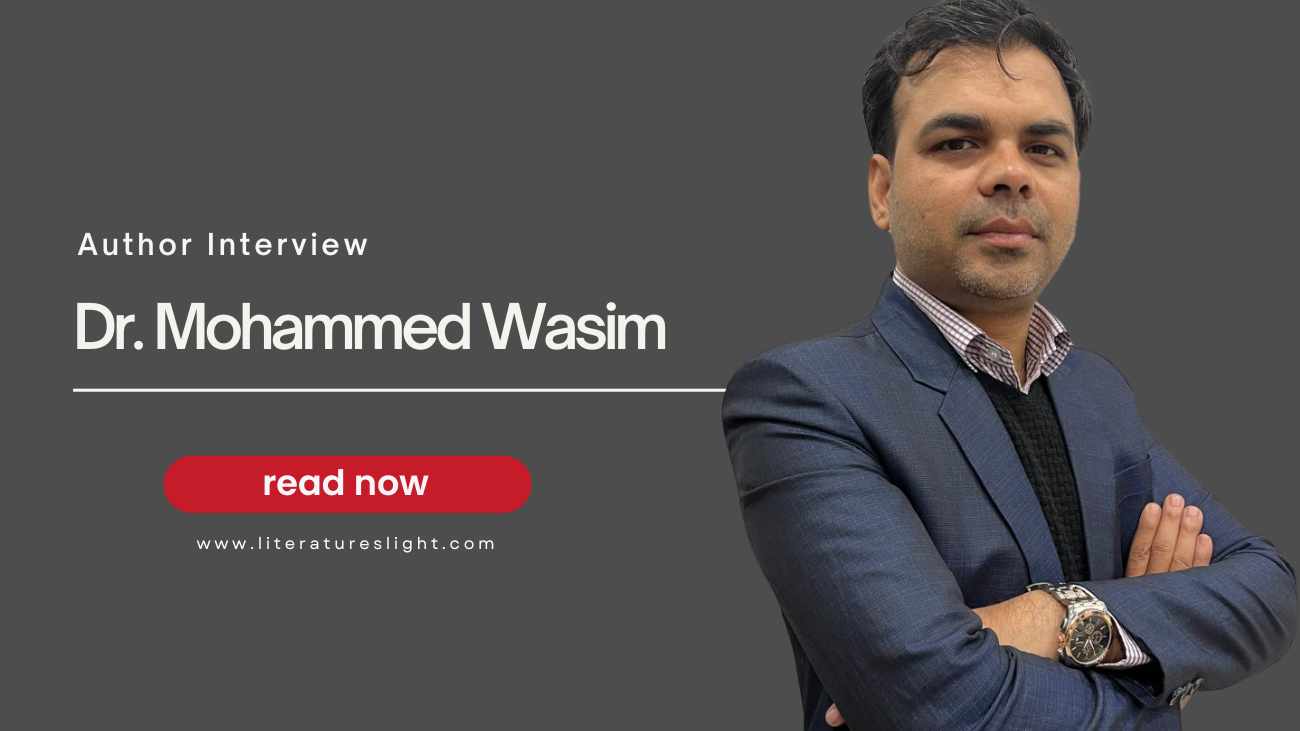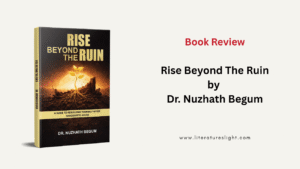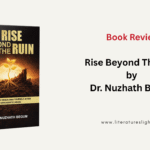Mohammed Wasim on The Backbencher in the Corporate World – An Inspiring Author Interview
Interviewer: What inspired you to write The Backbencher in the Corporate World? Was there a defining moment that led you to this theme?
Mohammed Wasim: The inspiration for The Backbencher in the Corporate World stemmed from my own journey—navigating the complexities of office dynamics while carrying the spirit of a backbencher who never quite fit the conventional mold. There wasn’t one defining moment, but rather a series of experiences that shaped my perspective: the silent struggles, the overlooked potential, and the unwritten rules that govern corporate life. I wanted to capture the essence of resilience, humour, and the unfiltered reality of being an underdog in a system that often values conformity over creativity. It’s a story that speaks to everyone who has ever felt out of place yet dreamed of making their mark.
Interviewer: The title is intriguing—what does being a “backbencher” mean to you personally, and how does it translate in a corporate setting?
Mohammed Wasim: To me, being a ‘backbencher’ is more than just sitting in the last row of a classroom—it represents a mindset, a way of navigating the world that often goes unnoticed. Backbenchers are silent observers, unconventional thinkers, those who resist the spotlight but still leave their mark in their own unique way. In a corporate setting, this translates into the individual who doesn’t always conform to rigid office norms, yet possesses untapped potential that, if recognized, can transform the workplace.
A backbencher in the corporate world might not be vocal in meetings but thinks beyond the obvious; isn’t constantly seeking validation, yet delivers results in unexpected ways. This book celebrates those who thrive on their own terms, proving that success doesn’t always require being front and center—it can come from the fringes, where the real magic often happens.
Interviewer: You’ve had a diverse career across education, publishing, corporate leadership, and social work. How did your varied experiences shape the insights in this book?
Mohammed Wasim: Every chapter in The Backbencher in the Corporate World is infused with lessons drawn from my varied experiences. Each field offered a different lens to view human dynamics, ambition, struggles, and resilience.
Education taught me the power of curiosity and the overlooked potential in those who don’t always conform to traditional learning structures. Publishing showed me the weight of storytelling—how narratives shape perception and influence decision-making. Corporate leadership gave me firsthand exposure to office hierarchies, the silent battles fought in boardrooms, and the untapped brilliance of those who don’t always seek the spotlight. Social work grounded me, reminding me that beyond job titles and KPIs, real success lies in empathy, impact, and meaningful connections.
These experiences shaped the insights in this book, providing a blend of humor, realism, and unconventional wisdom for those navigating the corporate maze without losing themselves.
Interviewer: You speak about the “unwritten rules” of the corporate world. Can you share one rule that most people overlook but should definitely pay attention to?
Mohammed Wasim: One unwritten corporate rule is that perception often outweighs performance. Hard work alone doesn’t guarantee recognition—visibility and strategic positioning matter. If you’re not seen, heard, or acknowledged, your contributions might go unnoticed. Success isn’t just about merit; navigating workplace dynamics is equally crucial. Balancing authenticity with workplace visibility can unlock real career growth.
Interviewer: Many professionals feel stuck or unseen in their jobs. What advice would you give them to reclaim their voice and value without changing who they are?
Mohammed Wasim: Feeling stuck or unseen can be frustrating, but reclaiming your voice doesn’t mean changing who you are—it means amplifying your strengths in ways that get noticed:
- Own your narrative – Don’t wait for others to define your value. Articulate your contributions, ideas, and unique perspective with confidence.
- Strategic visibility – You don’t have to be the loudest person in the room, but ensure decision-makers know the impact you bring.
- Build alliances – Find mentors and colleagues who recognize your potential and advocate for your growth.
- Adapt without losing authenticity – Workplace dynamics require navigation, but staying true to your principles is what makes you indispensable.
- Create opportunities – If the system doesn’t provide a space for your strengths, carve one out. Initiative and consistency always leave a mark.
Interviewer: Do you think corporate cultures are evolving to be more inclusive of unconventional talents—or is the backbencher still fighting an uphill battle?
Mohammed Wasim: Corporate cultures claim to be evolving, but the backbencher still fights unseen battles. Traditional hierarchies often reward visibility over quiet brilliance. Biases persist, making unconventional talents struggle for recognition. The system still favours compliance, forcing backbenchers to carve their own path. True change demands a redefinition of success—one that values creativity, resilience, and originality over mere conformity.
Interviewer: How do you personally define success—and has that definition changed over the course of your career?
Mohammed Wasim: Success isn’t a destination—it’s a constant, unrelenting pursuit of impact. Early in my career, I saw success as recognition, milestones, and visible achievements. Now, I define it by how much I shape, challenge, and redefine the world around me. It’s measured not in titles, but in influence, resilience, and the legacy left behind. Real success is carving a path where none existed—without waiting for permission.
Book Review: The Backbencher in the Corporate World
Interviewer: Which chapter or anecdote in the book is closest to your heart, and why?
Mohammed Wasim: The chapter that resonates most deeply with me is Unconventional Wisdom: Lessons from the Backbenchers—the story of the unnoticed worker who, despite being overlooked in meetings, becomes the backbone of critical decisions.
It’s close to my heart because it reflects the essence of backbenchers in the corporate world—those who may not dominate conversations but whose ideas shape the future. Their strength lies not in loud proclamations but in quiet, undeniable impact.
This chapter is a reminder that success isn’t about being the loudest; it’s about being indispensable in ways others don’t immediately see.
Interviewer: What was the biggest challenge you faced while writing this book, and how did you overcome it?
Mohammed Wasim: The biggest challenge I faced was choosing the right narrative—so many subjects intrigued me, but this one held an undeniable force.
At first, I explored different themes, but none resonated deeply enough to sustain a full-fledged book. The breakthrough came when I recognized that the corporate world itself is a stage for silent struggles, untapped potential, and unconventional victories.
Once the theme took hold, the writing became unstoppable—a raw, honest exploration of those who thrive outside the spotlight yet reshape the system from its edges. It wasn’t just a subject; it was a truth that demanded to be written.
Interviewer: Finally, what’s next for you as an author? Are there more books on the horizon?
Mohammed Wasim: The journey doesn’t stop here—two more books are in motion, each tackling subjects that demand attention and truth.
The first dives deep into the realities of Abroad Affairs—covering recruitment, study, and settlement abroad while exposing the shadows where people get deceived. Behind the glossy brochures and promises of opportunity lies a network of exploitation. This book uncovers the hidden pitfalls, arms readers with knowledge, and ensures that dreams of global success don’t turn into nightmares.
The second confronts an unspoken battle—spiritual clashes with prosperity. So many strive for success, yet unseen forces—beliefs, conditioning, internal conflicts—hold them back. Why do some struggle to embrace wealth while others soar effortlessly? What deeper forces shape financial destiny? This book explores the silent wars between faith, success, and self-sabotage, unlocking truths most refuse to acknowledge.
Both books are more than just narratives—they are revelations that will challenge perspectives, break illusions, and empower readers like never before.

Dr. Mohammed Wasim holds a Ph.D. in Human Resources and an MBA in Marketing. His career is marked by diverse accomplishments and leadership roles across various sectors.
He has served as the publisher of two influential youth magazines, Pulse Yo! and Podium, highlighting his commitment to youth empowerment and engagement. His leadership experience includes his role as the Director of Operations for the Assembly of God Church in Siliguri and the Siliguri Nazrul Society, where he demonstrated remarkable organizational skills and dedication.
Dr. Wasim’s academic contributions as an English teacher at All Nation Theological Seminary have made a significant impact on his students. In the corporate world, he has held the position of Managing Director at ChoNKim Tourism Pvt. Ltd., showcasing his versatility and business acumen.
Currently, Dr. Wasim leads two recruitment firms in India as Director and CEO. He also manages two ITES companies—one in India and another in the USA—in the same capacity. In addition to these roles, he oversees a mission school in India as Director and runs a Project Management company in the UAE.
The Backbencher Of The Corporate World is a landmark achievement in Dr. Wasim’s career, marking his venture into authorship with a mainstream publication. This book reflects his passion and dedication to inspiring and empowering others.
We congratulate Dr. Mohammed Wasim for his remarkable journey and commend him for this significant contribution to literature.






